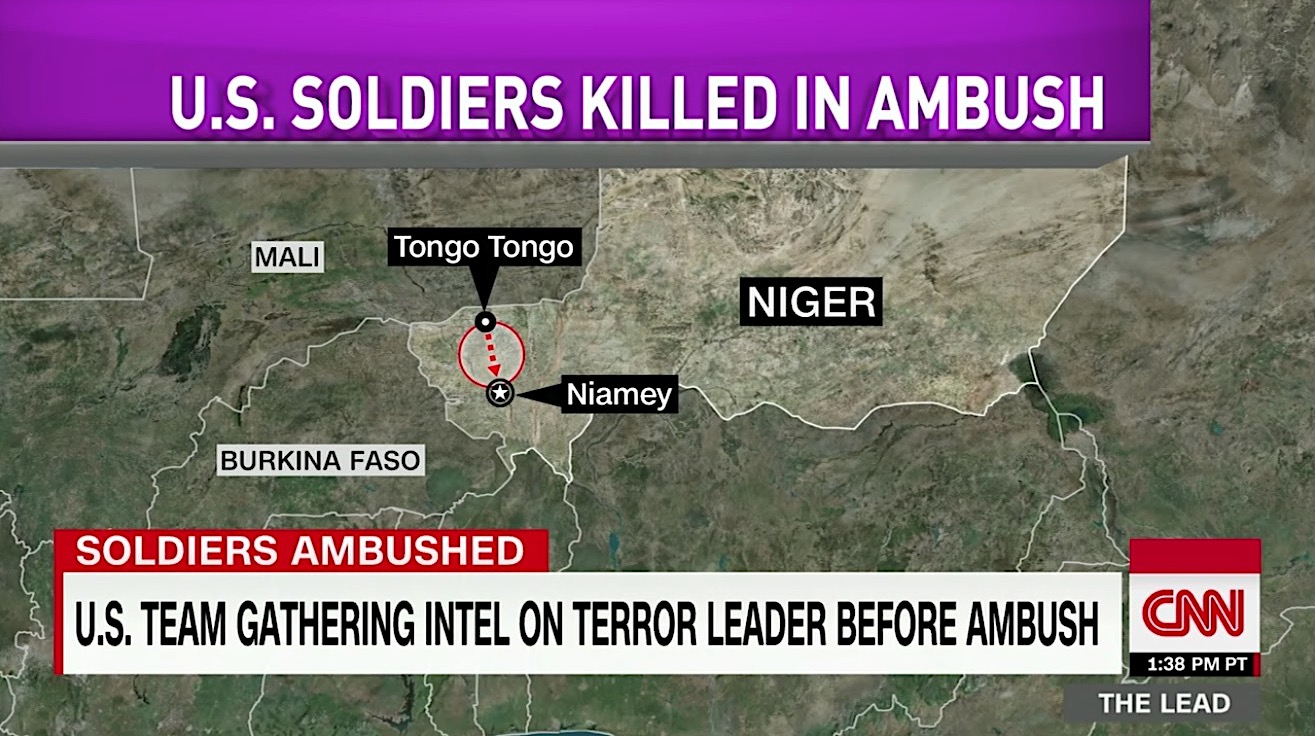The evolving timeline of the deadly Niger ambush still has holes


A free daily email with the biggest news stories of the day – and the best features from TheWeek.com
You are now subscribed
Your newsletter sign-up was successful
Sen. John McCain (R-Ariz.), after attending a classified Pentagon briefing Thursday on the Oct. 4 ambush in Niger that left four U.S. soldiers and five Nigerien troops dead, including a translator, said there are still "a hundred questions that need to be answered." Indeed, the public timeline of events is changing, leaving new questions; this summary of what we know is based on reports from The New York Times and CNN:
Oct. 3: Two groups of U.S. troops set off in southwest Niger in the night. One, made up of U.S., French, and Nigerien commandos, was on a covert mission to kill or capture an Islamic State operative; that mission was aborted due to weather. The other reconnaissance group included about eight U.S. Green Berets, three U.S. support soldiers, and 30 Nigerien troops. They were asked to remain in the area to search for information on the ISIS operative.
Oct. 4: In the morning, the second, lightly armed group dropped by the village of Tongo Tongo "to resupply and met with local elders out of courtesy," the Times says. There are differing opinions on whether villagers tipped off the local ISIS-linked militia or tried to warn the U.S-Nigerien group.
The Week
Escape your echo chamber. Get the facts behind the news, plus analysis from multiple perspectives.

Sign up for The Week's Free Newsletters
From our morning news briefing to a weekly Good News Newsletter, get the best of The Week delivered directly to your inbox.
From our morning news briefing to a weekly Good News Newsletter, get the best of The Week delivered directly to your inbox.

Shortly after the expedition left the village, at 11:40 a.m., about 50 militants ambushed them with heavy weapons. The U.S. soldiers immediately informed their commanders they were under attack, but didn't request backup for an hour. An aerial surveillance drone arrived within minutes, and French jets arrived an hour later. Two hours after that, French helicopters from Mali arrived to evacuate the soldiers, but they retrieved only seven Americans. The other four, apparently separated from the group, "were inexplicably left behind, no longer in radio contact, and initially considered missing in action by the Pentagon, a status that officials say raises the possibility they were still alive when the helicopters took off without them," the Times reports. The first team of U.S. commandos later found three of the four slain Americans.
Oct. 6: Nigerien troops found the fourth American, Sgt. La David Johnson, in the evening, reportedly a mile away from the ambush site. "American military officials still cannot explain why it took two more days and an exhaustive search by troops from all three countries" to find Johnson's body, the Times said.
Army Maj. Gen. Roger Cloutier Jr., AFRICOM chief of staff, will lead an investigation into the incident, expected to take 30-60 days.
A free daily email with the biggest news stories of the day – and the best features from TheWeek.com
Peter has worked as a news and culture writer and editor at The Week since the site's launch in 2008. He covers politics, world affairs, religion and cultural currents. His journalism career began as a copy editor at a financial newswire and has included editorial positions at The New York Times Magazine, Facts on File, and Oregon State University.
-
 Hyatt chair joins growing list of Epstein files losers
Hyatt chair joins growing list of Epstein files losersSpeed Read Thomas Pritzker stepped down as executive chair of the Hyatt Hotels Corporation over his ties with Jeffrey Epstein and Ghislaine Maxwell
-
 Political cartoons for February 17
Political cartoons for February 17Cartoons Tuesday’s political cartoons include a refreshing spritz of Pam, winter events, and more
-
 Alexei Navalny and Russia’s history of poisonings
Alexei Navalny and Russia’s history of poisoningsThe Explainer ‘Precise’ and ‘deniable’, the Kremlin’s use of poison to silence critics has become a ’geopolitical signature flourish’
-
 Nobody seems surprised Wagner's Prigozhin died under suspicious circumstances
Nobody seems surprised Wagner's Prigozhin died under suspicious circumstancesSpeed Read
-
 Western mountain climbers allegedly left Pakistani porter to die on K2
Western mountain climbers allegedly left Pakistani porter to die on K2Speed Read
-
 'Circular saw blades' divide controversial Rio Grande buoys installed by Texas governor
'Circular saw blades' divide controversial Rio Grande buoys installed by Texas governorSpeed Read
-
 Los Angeles city workers stage 1-day walkout over labor conditions
Los Angeles city workers stage 1-day walkout over labor conditionsSpeed Read
-
 Mega Millions jackpot climbs to an estimated $1.55 billion
Mega Millions jackpot climbs to an estimated $1.55 billionSpeed Read
-
 Bangladesh dealing with worst dengue fever outbreak on record
Bangladesh dealing with worst dengue fever outbreak on recordSpeed Read
-
 Glacial outburst flooding in Juneau destroys homes
Glacial outburst flooding in Juneau destroys homesSpeed Read
-
 Scotland seeking 'monster hunters' to search for fabled Loch Ness creature
Scotland seeking 'monster hunters' to search for fabled Loch Ness creatureSpeed Read
